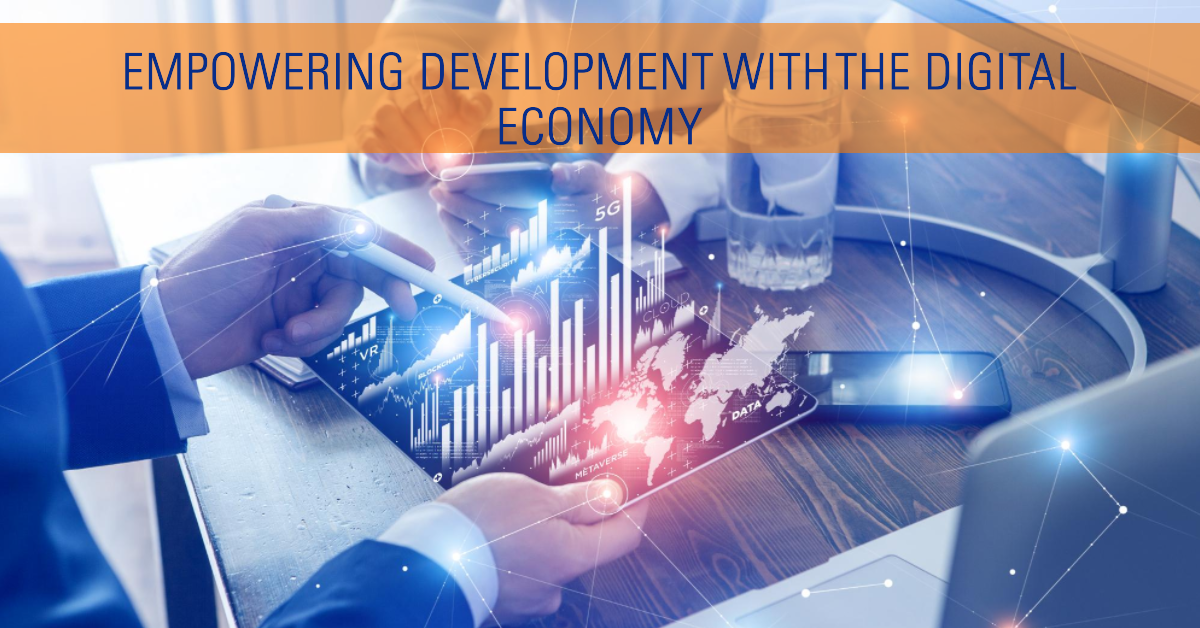Empowering Development: How the Digital Economy Accelerates Incredible Growth in Developing Countries
Discover how the digital economy is transforming developing countries, driving empowerment and growth. From entrepreneurship and financial inclusion to education and e-governance, explore the remarkable impact of digital technologies.

In an interconnected world where technological advancements are reshaping the fabric of societies, the digital economy has emerged as a powerful catalyst for development, especially in developing countries. This transformative force is not only redefining traditional economic landscapes but also creating unprecedented opportunities for growth, innovation, and empowerment.
A Global Shift: The Digital Economy's Reach
The digital economy encompasses a wide spectrum of activities, from e-commerce and digital services to mobile banking and online education. It transcends geographical boundaries, providing a level playing field for developing countries to participate in the global marketplace. Thanks to the ubiquity of smartphones and the increasing availability of internet access, even remote areas are now connected, enabling individuals to tap into the immense potential of the digital age.
Empowering Entrepreneurs and Startups
One of the most remarkable aspects of the digital economy is its ability to democratize entrepreneurship. In developing countries, where traditional barriers to entry can be high, the digital realm offers a lower-cost avenue for aspiring entrepreneurs to bring their ideas to life. Digital platforms allow small businesses and startups to showcase their products and services to a global audience, breaking down the barriers of distance and limited resources.
Take the story of Amina, a young artisan in a rural village who specializes in handcrafted jewelry. Through online marketplaces, she can now market her creations to customers halfway around the world. This access to a global customer base not only boosts her income but also helps preserve her community's traditional craftsmanship.
Financial Inclusion and Digital Payments
Access to financial services has long been a challenge in many developing nations. However, the digital economy has revolutionized this aspect through mobile banking and digital payment solutions. In countries where a significant portion of the population is unbanked or underbanked, mobile money platforms have provided a lifeline.
This shift has tangible implications for local economies. Families can send and receive remittances more efficiently, entrepreneurs can access capital without the need for traditional collateral, and governments can distribute social benefits directly to citizens. The ability to make financial transactions digitally not only accelerates economic activities but also lays the foundation for a more inclusive society.
Education and Skill Enhancement
Education is often touted as the cornerstone of development. With the advent of the digital economy, access to quality education is no longer confined to physical classrooms. Online learning platforms have opened up a world of possibilities for individuals seeking to enhance their skills or acquire new ones.
For instance, in rural areas with limited educational resources, students can now access courses from renowned institutions globally. This not only levels the educational playing field but also equips individuals with the skills required to participate in the digital workforce. As digital literacy becomes more widespread, it empowers people to take on roles that were previously out of reach.
Government Services and Civic Participation
The digital economy also intersects with governance and civic participation. E-governance initiatives have streamlined administrative processes, reducing bureaucratic bottlenecks and corruption. Citizens can now access essential government services online, making interactions more transparent and efficient.
Furthermore, digital platforms have become powerful tools for citizens to voice their opinions and hold authorities accountable. Social media and online forums have amplified civic engagement, enabling people to mobilize around critical issues and drive social change. This increased transparency and connectivity create an environment where governments are more responsive to the needs of their citizens.
Sustainable Development and Innovation
In the realm of sustainable development, the digital economy offers innovative solutions that address challenges ranging from climate change to healthcare access. Smart technologies can optimize resource utilization, while data-driven insights enable more informed decision-making.
For instance, precision agriculture powered by sensors and data analytics can enhance crop yields and reduce waste. Telemedicine platforms provide medical consultation to remote areas, bridging the healthcare gap. These innovations not only accelerate progress but also pave the way for a more sustainable future.
Challenges and Considerations
While the digital economy holds immense promise, it's essential to acknowledge the challenges that come with it. Digital divide, privacy concerns, and cybersecurity threats are among the issues that must be carefully navigated. Additionally, ensuring that the benefits of the digital economy are distributed equitably across all segments of society is a critical consideration.
Conclusion
The digital economy is reshaping the landscape of development in developing countries. Its impact goes beyond economic growth—it extends to education, entrepreneurship, financial inclusion, and civic engagement. By leveraging the power of digital technologies, these countries are accelerating their journey toward progress and empowerment.
As we move forward, it's imperative to prioritize strategies that ensure a more inclusive and sustainable digital economy. By doing so, we can harness the full potential of this digital revolution to create a world where opportunities are boundless and where every individual, regardless of their location, can participate in and benefit from the incredible growth that the digital economy offers.
ALSO READ
Crumbling Foundations: Crisis in Malakand's Educational Infrastructure
Empowering Young Minds: Nutritional Education in Karnataka
Supreme Court Upholds UP Madrassa Education Law
SC sets aside Allahabad HC order that had quashed UP Board of Madarsa Education Act and asked state to relocate students to other schools.
Strengthening Ties: Jaishankar Highlights QUAD, Community and Education in Australia Visit










